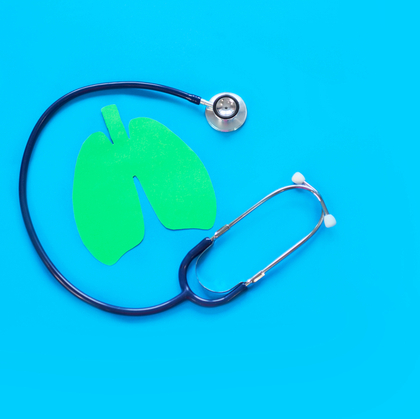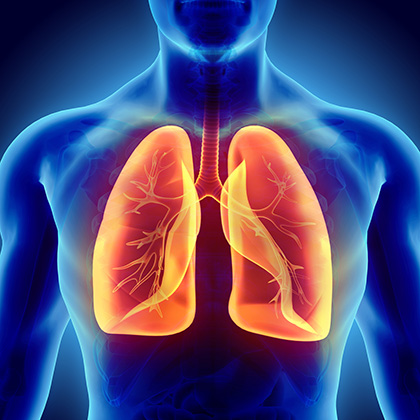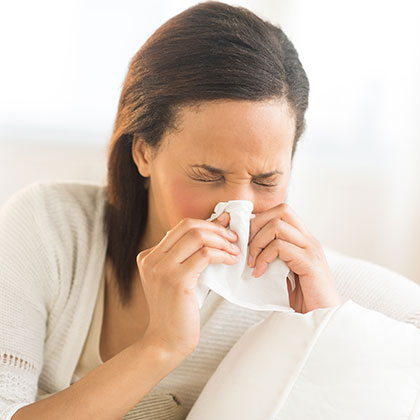
There can be few things more annoying than finding yourself in close proximity to someone with a nagging cough – and thanks to the Covid pandemic, it’s not just annoying but worrying too. If you’re the person with that cough, however, it can be at best irritating and uncomfortable and at worst painful (fractured ribs, for instance) and downright exhausting, not to mention it can make you feel thoroughly unwell.
Like many other health conditions, a cough can be acute or chronic (or somewhere in between, called subacute):
-
An acute cough lasts less than three weeks
-
Subacute coughs last from three to eight weeks
-
Chronic – or persistent – coughs last longer than eight weeks
The good news is most coughs clear up within three weeks and don’t need any treatment. They are, however, very common. According to the National Institute of Health and Care Excellence (NICE), coughs are the most common symptom for which people seek medical advice in the UK, with around 10 per cent of the general population having a chronic cough at any one time (i). Chronic coughs are also more common in women than in men, with people of both sexes in their fifties and sixties the most likely to be affected. Globally, two to 18 per cent of people are estimated to be affected by a chronic cough (ii).
What is a cough?
NICE describes a cough simply as a reflex response to airway irritation (iii). In other words, it’s an automatic reaction designed to keep your respiratory tract clear whenever you have irritants such as mucus, dust, microbes (or germs – bacteria, viruses etc), pollen, smoke, chemical fumes or other foreign particles in your throat or other airways.
These irritants stimulate your airway cough receptors, which send messages via the vagus nerve to an area in the brain stem called the ‘cough centre’. The cough itself starts with a sudden gasp of air that’s drawn deep into your lungs. The muscles of the chest, abdomen and diaphragm contract forcefully, allowing pressure to build up in the airways. Then the epiglottis – the flap of tissue at the back of your throat – quickly opens, letting the air rush out (in fact, if you cough really hard, the air comes out at almost the speed of sound (iv)). The noise of that air coming out of your lungs is what we recognise as a cough.

Because of the way it expels irritants from the airways, coughing actually protects your body and helps prevent your lungs from becoming inflamed or infected. You could say that coughing every now and then is completely normal and even good for you. In fact, it’s an essential tool in your body’s defence against illness (it could even save your life if you start choking on food that goes down your windpipe instead of your oesophagus – or food pipe – this is what we mean when we say food goes down the wrong way).
Types of cough
What causes a cough influences the type of cough it is. Coughs can be dry or wet – though you may be more familiar with a wet cough as a chesty or productive (as in it produces mucus) cough.
What is a dry cough?
Dry coughs are ‘tickly’ coughs and don’t produce any mucus. With a dry cough, the airways are irritated or inflamed, which makes them more sensitive.
Dry cough vs wet cough
While dry coughs feel tickly, if you have a wet, chesty or productive cough, your respiratory system produces a lot of mucus to help clear out viruses, bacteria and other substances from your airways and lungs. If you have a wet cough you’ll produce a lot more mucus and it may feel like you have something stuck in the back of your throat. In addition, some people often report a salty taste in their mouth or throat.
Chronic cough complications
But coughing isn’t just an annoying and uncomfortable experience. If you have a cough – especially one that lasts a long time – it can cause a range of complications, including low energy, reduced quality of life, relationship problems, depression, anxiety, social isolation and – if your cough doesn’t subside when you go to bed – difficulties with sleeping. A severe chronic cough can also cause a complication called cough syncope, which is when you lose consciousness during a coughing episode (this is most common in people with severe lung diseases such as asthma or COPD).
Chronic cough can also trigger stress urinary incontinence – up to half of women with a chronic cough are thought to experience this complication (v).
In general, however, the outlook is good if you have a cough. Most coughs caused by simple short-term viruses don’t need any special treatment and tend to get better quickly. Coughs caused by other factors may be more problematic – for instance, if you smoke and have a smoking-related illness, you may have a cough and other symptoms that worsen over time.
What causes a cough?
The most common causes of acute coughs include the following:
-
Upper respiratory tract infections such as the common cold, flu, laryngitis, respiratory syncytial virus or RSV (which can cause both upper and lower respiratory tract infections), sinusitis and COVID-19 are the most common causes of acute coughs (vi). These infections are typically caused by viruses. Coughs caused by viral infections tend not to last long, with symptoms usually clearing within three weeks.
-
Lower respiratory tract infections are less common than the upper respiratory tract type, but tend to be more serious, with examples including pneumonia and bronchitis. These infections can be caused by viruses but also by other germs such as bacteria and fungi.
-
Irritants you can breathe in such as smoke (including direct and passive or second-hand cigarette smoke), dust and chemical fumes can cause an acute cough.
-
Foreign bodies inhaled into the windpipe by accident such as food or other objects can cause short-term coughing too.
Subacute coughs, meanwhile, can be the result of an acute cough failing to resolve itself after three weeks, after the virus or other element that caused it has gone (doctors have a variety of terms for this including airway hyper-responsiveness, post-infectious cough or chronic refractory cough). Other infections that can cause a longer-lasting cough include tuberculosis (TB) and whooping cough (pertussis).
Common causes of chronic coughs, on the other hand, include:
-
Long-term respiratory infections such as chronic bronchitis.
-
Postnasal drip – or upper airway cough syndrome – is when things like infections, allergies and nasal polyps make your nose and/or sinuses produce more mucus, which irritates the nerves of the nasopharynx at the back of your throat.
-
Asthma can cause a chronic cough if it is undiagnosed or not treated effectively.
-
Irritants such as cigarette smoke (direct and second-hand) and others you can breathe in can cause a chronic cough, especially if you’re exposed to them in the long term.
-
Taking medicines called ACE inhibitors, which are prescribed for high blood pressure and cardiovascular disease, can cause a chronic cough in some people.
-
Acid reflux can cause a chronic cough when acid from your stomach leaks into your oesophagus and spills into your airways.
-
Smoking and smoking-related diseases such as COPD cause chronic coughing as well as other respiratory symptoms such as breathlessness.
Other diseases that can cause a chronic cough include cystic fibrosis, lung cancer, bronchiectasis, emphysema, sarcoidosis, pulmonary embolism (a blood clot in the lung), heart failure, cardiac arrhythmias, interstitial lung disease, obstructive sleep apnoea, thoracic aneurysm and pneumothorax, a condition where air becomes trapped in the chest outside the lung.
Sometimes, however, there may be no clear reason why you have a chronic cough. According to researchers, when this happens it can cause significant impairments in quality of life (vii).
Chronic cough treatments
While most acute coughs caused by short-term viruses don’t need any treatment and go away on their own, they can still be a nuisance. There are things you can do yourself at home to get some relief – read on to find out what you can do (see Self-help for a troublesome cough, below). You could also try a pharmacy cough remedy such as a cough syrup/medicine or some cough sweets or lozenges (note – children under the age of six shouldn’t take cough medicines, while those aged six to 12 years should only take them if a pharmacist or doctor has recommended them). According to the NHS, these remedies won’t stop your cough but they may help you to cough less (viii).
If you have a smoker’s cough, on the other hand, your GP will encourage you to stop smoking – read more about giving up in our guide to stop smoking.
If you have a chronic cough that has developed as a symptom of another condition, treating that condition is the usual approach – for instance, a postnasal drip is often treated with steroid nasal sprays and antihistamines, while acid reflux can be treated with medicines that help reduce stomach acid. If, on the other hand, your cough is caused by a bacterial infection, your doctor may prescribe antibiotics to help clear it up (however antibiotics do not help if you have a viral infection). Asthma, meanwhile, is usually treated with inhaled steroids to reduce inflammation in the airways.
When should you see a GP about a cough?
Most people who have a cough won’t need to see their doctor. But there are several instances in which you should seek medical help for a cough by seeing your GP or calling NHS 111, including the following:
-
Your cough has lasted for more than three weeks
-
You’re coughing up discoloured mucus or a lot of mucus
-
You’re experiencing persistent breathlessness
-
Your cough is severe (eg. you can’t stop coughing)
-
Your cough has quickly become much worse
-
You’re experiencing chest pain
-
You don’t have much of an appetite
-
You’re losing weight without trying
-
You have swollen glands (lumps) in your neck
-
You keep getting chest infections
-
You have a weakened immune system
-
Your voice sounds different
-
You’re sweating or have a high temperature
-
You’re coughing up blood (see a GP immediately)
How to treat a cough yourself
If your cough is a symptom of a viral infection and you don’t need to see a doctor, there are a few simple things you can do to make yourself more comfortable.
Try the following:
-
Rest as much as possible.
-
Stay warm (if it’s autumn or winter, set your heating thermostat to at least 18C and use a hot water bottle or electric blanket if you still feel chilly).
-
Drink lots of fluids – at least six to eight glasses or cups a day – as hot drinks can help relieve dryness in your throat caused by coughing and also thin mucus and ease congestion (a hot honey and lemon drink can help soothe your throat – squeeze half a lemon into some boiled water and add honey to taste or add a slice of lemon and some honey to black tea).
-
Stay at home if you can to prevent your virus from infecting others.
-
Take paracetamol or ibuprofen if you have any aches or pains (check with a pharmacist or doctor before taking ibuprofen as it’s not suitable for everyone).
-
Try a steam inhalation to see if it helps – alternatively use a vapouriser/humidifier or take a hot steamy shower. Also, try gargling with warm salt water to help shift the mucus in your throat.
-
If you’re coughing a lot at night, use an extra pillow to keep your head elevated while you sleep (this can help prevent mucus from your nose travelling down your throat).
How can you prevent a cough?
It may seem obvious, but if you’re a smoker the best way to prevent coughing is to quit smoking. Giving up can not only reduce the irritation that causes coughing but may help protect you against viral infections that cause coughing too.
It’s also a good idea to avoid contact with people who are unwell, especially those with viral infections that can cause a cough. If you can’t avoid being around people who are coughing, try to maintain a safe distance from them if at all possible, and practice good hand hygiene by washing your hands frequently to avoid picking up a virus from a surface they’ve coughed over (also try to avoid touching your eyes, nose and mouth until you can wash your hands properly).
Meanwhile, if you have an allergy that causes coughing, ask your GP or a pharmacist about allergy medicines you can try and avoid exposing yourself to the allergens that are causing the problem as much as possible.
Develop your natural immunity
Whether you already have a cough or you want to prevent one from developing, supporting your immune system can be helpful, especially when it comes to coughs caused by a respiratory tract virus. One way to make sure your resistance to bugs is working well is to eat as healthily as you can, as often as you can, as poor nutrition is thought to impair your immunity.
Immunity-boosting foods
One study involving more than 60,000 people living in Singapore has even found that eating a diet high in fibre from fruit and also possibly soya foods may reduce chronic respiratory symptoms such as coughing (ix). Another study suggests foods containing antioxidant vitamins – particularly vitamin C – have the biggest impact on obstructive lung disease (COPD, asthma, cystic fibrosis, bronchiectasis etc.) (x), so consider adding more C-rich foods to your diet such as citrus fruit, berries, broccoli, peppers and kiwi fruit.
Supplements for immunity
Diet is important for keeping your immune system strong. But even with the best will in the world, most of us don’t have the ideal diet day in, day out. One way to make sure your body – including your immune system – is getting all the essential nutrients it needs all of the time, even on diet off days, is to take a good-quality multivitamin and mineral supplement. Look for a product that contains good levels of all the main vitamins and minerals, including the antioxidant vitamins C and E as well as the antioxidant mineral zinc.
Find out more about multivitamin and mineral supplements by reading our guide to multivitamins and daily requirements.
Vitamin C
Alternatively you may want to take vitamin C and/or zinc on their own. Both nutrients are known for their antioxidant power, and are also important for the immune system. Vitamin C, for instance, supports a variety of functions of the immune system, with scientists thinking deficiency may lead to impaired immunity and a higher susceptibility to infections (xi). Several types of vitamin C supplements are available, including formulations that combine vitamin C with antioxidants called bioflavonoids and non-acidic forms of vitamin C that are gentle on the stomach.
Zinc
Zinc, meanwhile, is also thought to be essential for a strong immune system, with studies suggesting zinc deficiency may lead to immune dysfunction (xii). Look for a supplement that contains the mineral in its citrate form, as this is thought to be absorbed more easily by the body than other forms of zinc.
Vitamin D
Another vitamin you may want to think about taking is vitamin D, as it too is important for your immune system. There is even some evidence that being deficient in vitamin D may make you more susceptible to infections (xiii). This is a particular concern in northern hemisphere countries like the UK, where vitamin D deficiency is considered common. This happens because our main source of vitamin D is sunlight, which is in short supply in this part of the world during the autumn and winter months.
Public Health England even advises adults and children over the age of one-year-old to consider taking a daily supplement containing 10 micrograms of vitamin D in the autumn and winter, with some encouraged to take a supplement all year round (people who don’t get outdoors much, for instance, people with dark skin and those who are covered up when they do go out) (xiv).
The recommended form of vitamin D is vitamin D3 or cholecalciferol, as it’s the natural form of vitamin D that the body makes when it’s exposed to sunlight. Vitamin D3 supplements are available in tablet form as well as in veggie-friendly drops. Most vitamin D3 supplements are made from the fat of lamb’s wool, which means they’re unsuitable for vegans. The good news is that vegan vitamin D3 supplements sourced from lichen are now more widely available.
Echinacea
Herbal preparations that may be useful for maintaining a strong immune system include echinacea (officially called echinacea purpurea). A popular medicinal herb, it’s used to relieve the symptoms of viral infections such as the common cold and flu, based on traditional use only. There is also some evidence that various forms and species of echinacea may reduce cold symptoms and help you get over a cold faster (xv).
Elderberry
Elderberries, which are grown on the Sambucus tree, also have a long traditional use for the relief of cold and flu symptoms. Some studies suggest elderberry extract may reduce flu symptoms by three to four days, and that it may also help strengthen the immune system by increasing the production of cytokines, a type of immune cell (xvi). Since elderberries aren’t suitable for eating or drinking raw (this can cause nausea, vomiting and diarrhoea), a convenient and safe way to get them is to take an elderberry extract or an eldeberry cough syrup.
More information on colds, coughs and flu
For more information about colds, flu and other viral infections, as well as a wide variety of other health conditions, take a tour around our pharmacy health library.
References:
-
Available online: https://cks.nice.org.uk/topics/cough/background-information/prevalence/
-
Available online: https://patient.info/doctor/chronic-persistent-cough-in-adults-pro
-
Available online: https://cks.nice.org.uk/topics/cough/background-information/definition/
-
Available online: https://www.health.harvard.edu/staying-healthy/that-nagging-cough
-
Available online: https://cks.nice.org.uk/topics/cough/background-information/complications/
-
Available online: https://patient.info/chest-lungs/cough-leaflet
-
Gibson P, Wang G, McGarvey L, et al.. Treatment of Unexplained Chronic Cough: CHEST Guideline and Expert Panel Report. Chest 2016 Jan;149(1):27-44. Available online: https://www.ncbi.nlm.nih.gov/pmc/articles/PMC5831652/
-
Available online: https://www.nhs.uk/conditions/cough/
-
Butler LM, Koh WP, Lee HP, Yu MC. Dietary Fiber and reduced Cough with Phlegm. A Cohort Study in Singapore. Am J Respir Crit Care Med 2004 Aug 1;170(3):279-87. Available online: https://www.atsjournals.org/doi/full/10.1164/rccm.200306-789OC#.Vf3XQZcROVA
-
Romieu I, Trenga C. Diet and obstructive lung disease. Epidemiol Rev 2001;23(2):268-87. Available online: https://academic.oup.com/epirev/article/23/2/268/510356?login=false
-
Carr AC, Maggini S. Vitamin C and immune function. Nutrients 2017 Nov;9(11). Available online: https://www.ncbi.nlm.nih.gov/pmc/articles/PMC5707683/
-
Keen CL, Gershwin ME. Zinc deficiency and immune function. Annu Rev Nutr. (1990);10:415-31. Available online: https://www.ncbi.nlm.nih.gov/pubmed/2200472
-
Aranow C. Vitamin D and the Immune System. J Investig Med. (2011 Aug);59(6):881-886. Available online: https://www.ncbi.nlm.nih.gov/pmc/articles/PMC3166406/
Hewison M. Vitamin D and immune function: an overview. Proc Nutr Soc. (2012 Feb);71(1):50-6. Available online: https://www.ncbi.nlm.nih.gov/pubmed/21849106 -
Available online: https://www.gov.uk/government/news/phe-publishes-new-advice-on-vitamin-d
-
Goel V, et al.. Efficacy of a standardized echinacea preparation (EchinilinTM) for the treatment of the common cold: a randomized, double-blind, placebo-controlled trial. J Clin Pharm Ther. (2004). 29:75-84. Available online: https://onlinelibrary.wiley.com/doi/abs/10.1111/j.1365-2710.2003.00542.x
Goel V, et al.. A proprietary extract from the echinacea plant (Echinacea purpurea) enhances systemic immune response during a common cold. Phytother Res. (2005 Sep 21). Available online: https://onlinelibrary.wiley.com/doi/abs/10.1002/ptr.1733 -
Goel V, et al.. Efficacy of a standardized echinacea preparation (EchinilinTM) for the treatment of the common cold: a randomized, double-blind, placebo-controlled trial. J Clin Pharm Ther. (2004). 29:75-84. Available online: https://onlinelibrary.wiley.com/doi/abs/10.1111/j.1365-2710.2003.00542.x
Goel V, et al.. A proprietary extract from the echinacea plant (Echinacea purpurea) enhances systemic immune response during a common cold. Phytother Res. (2005 Sep 21). Available online: https://onlinelibrary.wiley.com/doi/abs/10.1002/ptr.1733
Related Posts
Disclaimer: The information presented by Nature's Best is for informational purposes only. It is based on scientific studies (human, animal, or in vitro), clinical experience, or traditional usage as cited in each article. The results reported may not necessarily occur in all individuals. Self-treatment is not recommended for life-threatening conditions that require medical treatment under a doctor's care. For many of the conditions discussed, treatment with prescription or over the counter medication is also available. Consult your doctor, practitioner, and/or pharmacist for any health problem and before using any supplements or before making any changes in prescribed medications.

Christine
Christine Morgan has been a freelance health and wellbeing journalist for almost 20 years, having written for numerous publications including the Daily Mirror, S Magazine, Top Sante, Healthy, Woman & Home, Zest, Allergy, Healthy Times and Pregnancy & Birth; she has also edited several titles such as Women’ Health, Shine’s Real Health & Beauty and All About Health.
View More



